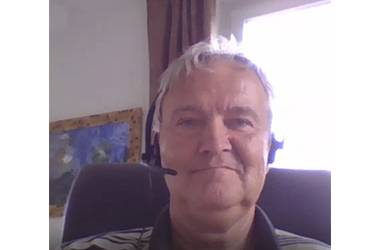Wittenborg Online News!
How Dutch Multinational, Philips, Weathered the COVID-19 Storm
How Dutch Multinational, Philips, Weathered the COVID-19 Storm
How Dutch Multinational, Philips, Weathered the COVID-19 Storm
Philips Presents Excellent Pandemic Case Study for Wittenborg Business Students
A few years ago, Dutch multinational, Philips, started reducing the number of flights taken by its staff around the world to offset the company's carbon footprint. So by the time COVID-19 broke out, many of its employees were already used to working remotely from home or otherwise. Still, the company had to make some innovative changes and ethical choices to weather the crisis around the pandemic, says Philips' Business Information Manager, Wim Oonk, one of a few business executives who took part in Wittenborg University of Applied Sciences' recent Project Week, to shed light on their company's response to COVID-19. For the past two years Oonk has also been a lecturer at Wittenborg in Enterprise Information Management.
According to Oonk, who was interviewed by Lucy Omwoha, Wittenborg lecturer and Project Week Coordinator, one of the problems Philips encountered early on was the fact that the components for its products are made in factories all over the world and when borders closed, that obviously presented a problem. Philips, formerly one of the largest electronics companies in the world, is currently focused on the area of health technology.
Oonk told Omwoha: "For instance, hospitals all over the world required fans, starting in China. Just to give you an idea, we used to produce 1,000 fans per month, globally. That has now gone up to 100,000, so we had to speed up production. Components come from all over the world, but as borders were shutting down it became very difficult to get the right components to the right place. The CEO had a very challenging task. Also, you obviously cannot supply everyone, so the question became, who do you supply first?"
New Opportunities for Companies to Adapt and Profit
Oonk also explained how COVID-19 presented new opportunities for companies to innovate and adapt. "Business, for instance, went down in the automotive industry, but they became suppliers of other products needed in the pandemic economy."
Ensuring Business Continuity
Though it was hardly possible to prepare for the COVID-19 crisis, Philips had learned some lessons from other world events and was able to apply that knowledge. "Some of the investments we made a couple of years ago to ensure business continuity has really paid off," Oonk said. For instance, our CO2 emissions as a company were too high, so we started to decrease flights and some staff started working remotely. With COVID-19 that was only intensified. Our knowledge of China and the tsunami in Japan taught us that critical suppliers need to be identified, and that helped to keep business going.
During COVID-19, Philips also saw an increase in online orders. "For instance, demand for hair cutting equipment and shavers went up. There were also increased orders in health technology. Here it is important to note that we did not feel it was ethical to raise prices, so we did not do that. Thus, prices stayed the same, but obviously we incurred more costs because people were working around the clock. In times like these, the ethics your company adhere to really become important. People order more by Internet, shops deliver at home."
What is next for Philips? According to Oonk it is developing more software for the health sector. "Many patients cannot go to the doctor, but still they need to be observed closely. Even in hospitals protective clothing is often not enough. So we are investing more in diagnostic image software."
WUP 9/6/2020
by Anesca Smith
©
WUAS Press
606 words
